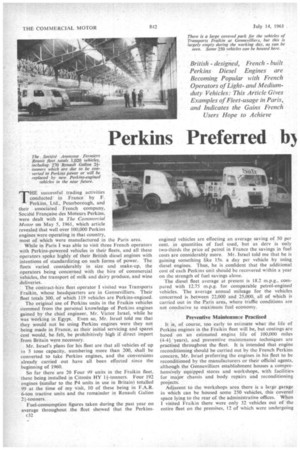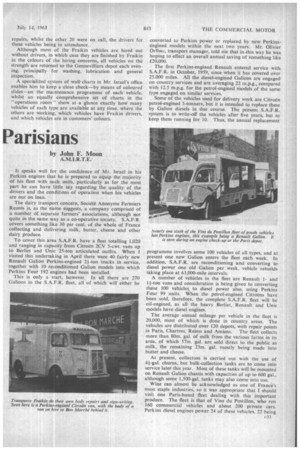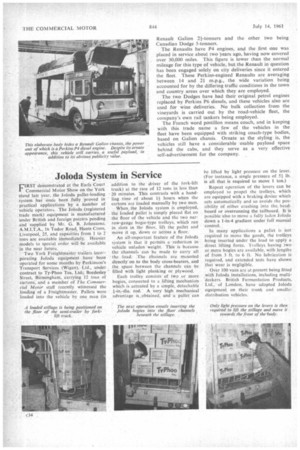Perkins Preferred b) Parisians
Page 72

Page 73

Page 74

If you've noticed an error in this article please click here to report it so we can fix it.
British designed, French built Perkins Diesel Engines are Becoming Popular with French Operators of Lightand Mediumduty Vehicles: This Article Gives Examples of Fleet-usage in Paris, and Indicates the Gains French Users Hope to Achieve by John F. Moon
THE successful trading activities conductedin France by F. Perkins, Ltd., Peterborough, and their associated French company, Societe Francaise des Moteurs Perkins, were dealt with in The Commercial Motor on May 5, 1961, which article revealed that well over 100,000 Perkins engines were operating in that country, most of which were manufactured in the Paris area.
While in Paris I was able to visit three French operators with Perkins-powered vehicles in their fleets, and all these operators spoke highly of their British diesel engines with intentions of standardizing on such forms of power. The fleets varied considerably in size and make-up, the operators being concerned with the hire of commercial vehicles, the transport of milk and dairy produce, and wine deliveries.
The contract-hire fleet operator I visited was Transports Fraikin, whose headquarters are in Gennevilliers. Their fleet totals 300, of which 119 vehicles are Perkins-engined.
The original use of Perkins units in the Fraikin vehicles stemmed from the personal knowledge of Perkins engines gained by the chief engineer, Mr. Victor Israel, while he was working in Egypt. Even so, Mr. Israel told me that they would not be using Perkins engines were they not being made in France, as their initial servicing and spares cost would, he felt, be prohibitively high if direct import from Britain were necessary.
Mr. Israel's plans for his fleet are that all vehicles of up to 5 tons capacity, numbering more than 200, shall be converted to take Perkins engines, and the conversions already carried out have all been effected since the beginning of 1960.
So far there are 20 Four 99 units in the Fraikin fleet, these being installed in Citroen HY 1-1-tonners. Four 192 engines (similar to the P4 units in use in Britain) totalled 99 at the time of my visit, 10 of these being in F.A.R. 6-ton tractive units and the remainder in Renault Galion 21-tonners.
Fuel-consumption figures taken during the past year on average throughout the fleet showed that the Perkinsc32
engined vehicles are effecting an average saving of 50 per cent. in quantities of fuel used, but as dery is only two-thirds the price of petrol in France the savings in fuel costs are considerably more. Mr. Israel told me that he is gaining something like 15s. a day per vehicle by using diesel engines. Thus, he is confident that the additional cost of each Perkins unit should be recovered within a year on the strength of fuel savings alone.
The diesel fleet average at present is 18.2 m.p.g., compared with 12.75 m.p.g. for comparable petrol-engined vehicles. The average annual mileage for the vehicles concerned is between 22,000 and 25,000, all of which is carried out in the Paris area, where traffic conditions are not conducive to maximum fuel economy.
Preventive Maintenance Practised
It is, of course, too early to estimate what the life of Perkins engines in the Fraikin fleet will be, but costings are based on an estimated engine life of 100,000 miles (4-41 years), and preventive maintenance techniques are practised throughout the fleet. It is intended that engine reconditioning should be carried out by the French Perkins concern, Mr. Israel preferring the engines in his fleet to be reconditioned by the manufacturers or their official agents, although the Gennevilliers establishment houses a comprehensively equipped stores and workshops, with facilitie% for major chassis and body repairs and reconditioning projects.
Adjacent to the workshops area there is a large garage in which can be housed some 250 vehicles, this covered space lying to the rear of the administrative offices. When I visited Fraikin there were only 32 vehicles out of the entire fleet on the premises, 12 of which were undergoing repairs, whilst the other 20 were on call, the drivers for these vehicles being in attendance., Although most of the Fraikin vehicles are hired out without drivers, in which case they are finished by Fraikin in the colours of the hiring concerns, all vehicles on the strength are returned to-the Gennevilliers depot each evening, principally for washing, lubrication and general inspection.
A specialized system of wall' charts in Mr. Israel's office enables him to keep a close check—by means of coloured slides—on the maintenance programme of each vehicle, whilst an equally comprehensive set of charts in the "operations room" show at a glance exactly how many vehicles of each type are available at any time, where the others are working, which vehicles have Fraikin drivers, and which vehicles are in customers' colours.
It .speaks well for the confidence of Mr. Israel in his Perkins engines that he is prepared to equip the majority of his fleet with such units, particularly as for the most part he can have little say regarding the quality of the drivers and the conditions of operation when his vehicles are out on loan.
The dairy transport concern, Societe Anonyme Fermiers Reunis is, as the name suggests, a company comprised of a number of separate farmers' associations, although not quite in the same way as a co-operative society. S.A.F.R. covers something like 30 per cent, of the whole of France collecting and delivering milk, butter, cheese and other dairy produce.
To cover this area S.A.F.R. have a fleet totalling 1,020 and ranging in capacity from Citroen 2CV 5-cwt. vans up to Berliet and Unic 25-ton articulated outfits. When I visited this undertaking in April there were 40 fairly new Renault Galion Perkins-engined 2-1-ton trucks in service, together with 10 reconditioned Galion models into which Perkins Four 192 engines had been installed.
This is only a start, however. In all there are 270 Cialions in the S.A.F.R. fleet, all of which will either be converted to Perkins power or replaced by new Perkinsengined models within the next two years. Mr. Olivier Orlhac, transport manager, told me that in-this way he was hoping to effect an overall annual saving of something like £20,000.
The first Perkins-engined Renault entered service with S.A.F.R. in October, 1959, since when it has covered over 25,000 miles. All the diesel-engined Galions are engaged on country services and are averaging 22 m.p.g., compared with 12.5 m.p.g. for the petrol-engined models of the same type engaged on similar services.
Some of the vehicles used for delivery work are Citroen petrol-engined 5-tonners, but it is intended to replace these by Galion diesels in due course. The present S.A.F.R. system is to write-off the vehicles after five years, but to keep them running for 10. Thus, the annual replacement programme involves some 100 vehicles of all types, and at present one new Galion enters the fleet each week. In addition, S.A.F.R. are reconditioning and converting to diesel power one old Galion per week, vehicle rebuilds taking place at 63,000-mile intervals.
A number of vehicles in the fleet are Renault 1and 11-ton vans and consideration is being given to converting these 100 vehicles to diesel power also, using Perkins Four 99 units. When the petrol-engined Citroens have been sold, therefore, the complete S.A.F.R. fleet will be oil-engined, as all the heavy Berliet, Renault and Unic models have diesel engines.
The average annual mileage per vehicle in the fleet is 20,000, most of which is done in country areas. The vehicles are distributed over 120 depots, with repair points in Paris, Chartres, Reims and Amiens. The fleet collects more than 80m. gal. of milk from the various farms in its area, of which 57m, gal. are sold direct to the public as milk, the remaining 23m. gal. mostly being made into butter and cheese.
At present, collection is carried out with the use of 4+-gal. churns, but bulk-collection tanks are to come into service later this year. Most of these tanks will be mounted on Renault Galion chassis with capacities of up to 600 gal., although some 1,500-gal. tanks may also come into use.
Wine can almost be acknowledged as one of France's most staple industries, so it was appropriate that I should visit one Paris-based fleet dealing with this important produce. The fleet is that of Vins du Postilion, who run 160 commercial vehicles and about 200 private cars. Perkins diesel engines power 24 of these vehicles, 22 being Renault Galion 21-tonners and the other two being Canadian Dodge 5-tonners.
The Renaults have P4 engines, and the first one was placed in service about two years ago, having now covered over 30,000 miles. This figure is lower than the normal mileage for this type of vehicle, but the Renault in question has been engaged solely on city deliveries since it entered the fleet. These Perkins-engined Renaults are averaging between 14 and 21 m.p.g., the wide variation being accounted for by the differing traffic conditions in the town and country areas over which they are employed.
The two Dodges have had their original petrol engines replaced by Perkins P6 diesels, and these vehicles also are used for wine deliveries. No bulk collection from the vineyards is carried out by the road-vehicle fleet, the company's own rail tankers being employed.
The French word postilion means coach, and in keeping with this trade name a few of the vehicles in the fleet have been equipped with striking coach-type bodies, based on Galion chassis. Ornate as the styling is, the vehicles still have a considerable usable payload space behind the cabs, and they serve as a very effective self-advertisement for the company.
































































































































